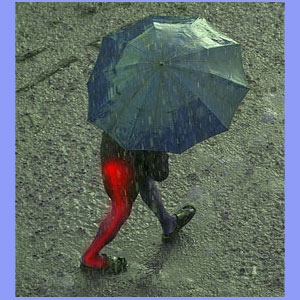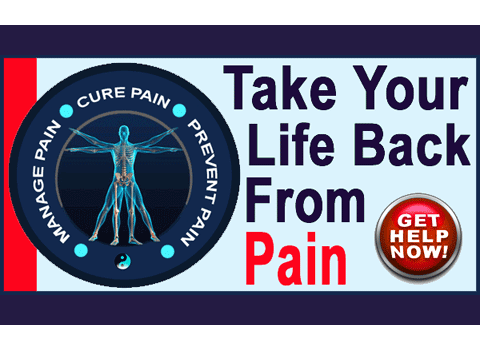
Experiencing sciatica when raining is a far more common patient complaint than one might think. In fact, many weather conditions might be implicated in exacerbating sciatic nerve symptoms, including high humidity and low atmospheric pressure. Although science has studied the intimate relationship between weather changes and back pain for decades already, there have been no conclusive links established that might explain all instances of symptomatic escalation or relief. We receive many letters from patients who insist that weather definitely influences the degree, duration and location of their pain. It is for this reason that we thought it time to investigate the correlation for ourselves.
This essay examines the relationship between rain, humidity and low atmospheric pressure, and the incidence of sciatica.
Sciatica When Raining or Low Pressure
Rain, humidity and low barometric pressure are all inter-related and exist mostly in combination with one another. Meanwhile, high barometric pressure usually exists with calm weather and lower humidity levels.
We have never heard any sciatica sufferer complain about high pressure fronts and the associated weather changes. However, we get a steady supply of correspondences that implicate low pressure, rain and high humidity as factors that worsen sciatic nerve pain.
Some patients are obsessed with the idea that the rain or humidity is the direct cause of the pain, while others look beyond the obvious weather patterns to condemn the underlying low pressure as being causative. I know from personal experience that my body feels better in some weather than in other types of climate. Low pressure rainy days make me feel extra achy, while high pressure sunny weather helps me to function better.
Over the years, we have come across many possible justifications for exacerbated sciatica symptoms due to inclement weather, so we decided to explore the credibility of some of the more plausible explanations in the section below.
Sciatica from Bad Weather
Low pressure allows anatomical tissues to expand. This is logical, since there is less external pressure on all parts of the body. This is why most doctors concentrate on low pressure being the actual factor that causes symptomatic intensification in most patients.
In true spinal sciatica conditions, the pain is generated by compression of the nerve roots that eventually combine to form the sciatic nerve. Since increased compression will usually worsen pain, and since low pressure allows tissue expansion and facilitates subsequent increased impingement, it is understandable why pain might magnify during low pressure weather systems.
It is true that the changes in anatomical tissues are microscopic, in response to high or low pressure, but for patients who already suffer nerve impingement, these tiny alterations could scientifically explain the worsening in symptoms.
We also must include the possibility of mindbody exacerbating factors when the weather is poor. Many studies have found decreases in certain organic body chemicals when it rains. Additionally, psychological testing has clearly established a link between mood, depression, sleep patterns and general mindset in relation to the climate outside. It is for this reason that poor weather might also intensify sciatica sufferings. When a person feels gloomy, depressed, unable to sleep and generally negative about life, research proves that their pain will be worse.
Therefore, there are both purely structural and mindbody explanations for the occurrence of sciatica pain progressing during unpleasant weather systems.
Is Sciatica When Raining Plausible?
Regardless of the acceptance of weather-related symptoms by the medical community, any objective mind must consider the massive number of first-hand patient accounts that claim worsened pain during bad weather. We might not have the benefit of an exact explanation of why this symptomatic intensification occurs, but we can still simply acknowledge that in many patients, sciatica worsens during the rain. It is truly an example of not needing to fully understand the laws of nature, but needing to respect them, nonetheless.
If you desire a personalized response as to why your pain might worsen when it rains, talk to your doctor. They may or may not be able to help you understand specific factors that magnify your pain.
As a final note, all is not bad when it comes to weather-related pain. Many patients report symptomatic improvement when relocating to a climate that features lower humidity, less rain and higher atmospheric pressure. This fact is food-for-thought for patients who can not find relief from any other means.
Other weather factors can also play roles in intensification and relief of symptoms, as well. I can tell you for sure that cold weather exacerbates my pain, since it causes increased stiffness and muscular contractions from shivering and conserving body heat. Meanwhile, in the warmest of weather, I always feel more than 100% better. Of course, you can also factor in my personal love for warmth and abhorrence of cold. Never forget to account for the mindbody factors!





